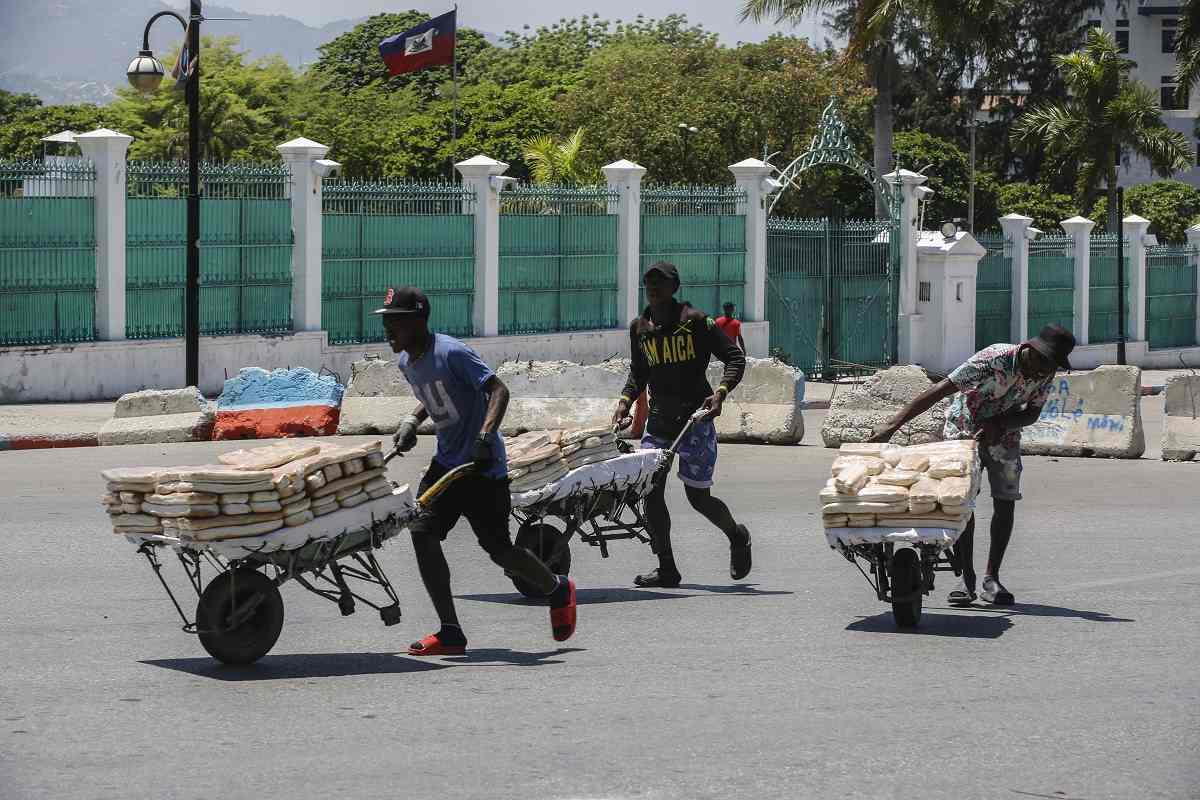Haiti’s Surge in Gang Violence Has Led More than 53,000 to Flee the Capital in Less than Three Weeks

Street vendors withdraw from the area where they were selling their bread, near the National Palace, in Port-au-Prince, Haiti, Tuesday, April 2, 2024.
12:07 JST, April 3, 2024
PORT-AU-PRINCE, Haiti (AP) — More than 53,000 people have fled Haiti’s capital in less than three weeks, the vast majority to escape unrelenting gang violence, according to a United Nations report released Tuesday.
More than 60% are headed to Haiti’s rural southern region, which worries U.N. officials.
“Our humanitarian colleagues emphasized that these departments do not have sufficient infrastructure, and host communities do not have sufficient resources, to cope with the large number of people fleeing Port-au-Prince,” said U.N. spokesman Stephane Dujarric.
The southern region already hosts more than 116,000 Haitians who previously left Port-au-Prince, according to the report by the U.N.’s International Organization for Migration.
The exodus from the capital of some 3 million people began shortly after powerful gangs launched a series of attacks on government institutions at the end of February. Gunmen have burned police stations, opened fire on the main international airport that remains closed and stormed Haiti’s two biggest prisons, releasing more than 4,000 inmates.
More than 1,500 people have been reported killed up to March 22, and another 17,000 have been left homeless, according to the U.N.
Among the rare travelers trying to head north instead of south from the capital were Marjorie Michelle-Jean, a 42-year-old street vendor, and her two children, ages 4 and 7.
“I want to see them alive,” she said, explaining that stray bullets keep hitting the tin roof of their home. Last week, they tried twice to travel to her hometown of Mirebalais in central Haiti but were forced to turn back because of roadblocks.
“I will definitely try again,” she said. “It’s absolutely not safe in Port-au-Prince.”
Of the 53,125 people who fled Port-au-Prince from March 8-27, nearly 70% already had been forced to abandon their homes and were living with relatives or in crowded and unsanitary makeshift shelters across the capital, the U.N. found.
More than 90% of Haitians leaving the capital have been crowding into buses, risking travel through gang-controlled territory where gang rapes have been reported and gunmen have been known to open fire on public transport.
The violence forced Prime Minister Ariel Henry to announce last month that he would resign once a transitional presidential council is created. Henry was in Kenya to push for the U.N.-backed deployment of a police force from the East African country when the attacks began, and he remains locked out of Haiti.
The transitional council, which will be responsible for choosing a new prime minister and council of ministers, has yet to be formally established.
Meanwhile, the mass migration from Port-au-Prince is expected to continue.
But Gary Dorval, 29, who was among a handful of people joining a demonstration on Tuesday, said he wants to stay until a new government is installed: “I want to be part of the change.”
"News Services" POPULAR ARTICLE
-

American Playwright Jeremy O. Harris Arrested in Japan on Alleged Drug Smuggling
-

Japan’s Nikkei Stock Average as JGB Yields, Yen Rise on Rate-Hike Bets
-

Japan’s Nikkei Stock Average Licks Wounds after Selloff Sparked by BOJ Hike Bets (UPDATE 1)
-

Japan’s Nikkei Stock Average Buoyed by Stable Yen; SoftBank’s Slide Caps Gains (UPDATE 1)
-

Japanese Bond Yields Zoom, Stocks Slide as Rate Hike Looms
JN ACCESS RANKING
-

Tokyo Economic Security Forum to Hold Inaugural Meeting Amid Tense Global Environment
-

Keidanren Chairman Yoshinobu Tsutsui Visits Kashiwazaki-Kariwa Nuclear Power Plant; Inspects New Emergency Safety System
-

Imports of Rare Earths from China Facing Delays, May Be Caused by Deterioration of Japan-China Relations
-

University of Tokyo Professor Discusses Japanese Economic Security in Interview Ahead of Forum
-

Japan Pulls out of Vietnam Nuclear Project, Complicating Hanoi’s Power Plans

























